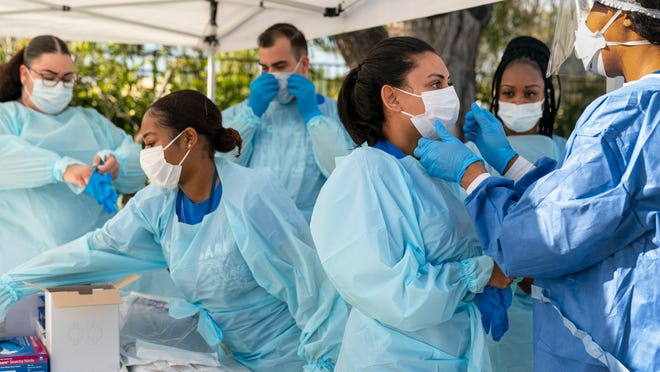Here are nine actions recommended by health experts and the U.S. Centers for Disease Control and Prevention to get information about your health if you feel ill over the next few weeks or months.
Take a deep, cleansing breath. If you’re congested, do the best you can. If you are developing COVID-19, the upper-respiratory illness that results from infection by the novel coronavirus, you are most likely going to recover. Be calm.
Do an inventory of symptoms. Dry cough is one. Are you also short of breath? Do you have a fever? Normal body temperature is 98.6 Fahrenheit, and anything above 100 degrees is considered a fever. These symptoms mean you’re sick with something.
Other flu-like symptoms of COVID-19 include chills, body aches, sore throat, headache, diarrhea, nausea, vomiting and runny nose.
The Ohio Department of Health says “emergency warning signs” for COVID-19 in adults include difficulty breathing, persistent pain or pressure in the chest, confusion or an inability to wake up, or bluish lips or face.
Call your doctor immediately. Unless you are having critical problems (more on that later), do not go into the nearest emergency department. Call your usual medical provider before seeking care. If you have a scheduled appointment sometime soon, call the doctor’s office to report you have symptoms of COVID-19. The doctor’s staff can then protect themselves and others in the office from infection.
If you do not have a relationship with a primary care doctor, call your local health department. If you have private insurance, your carrier keeps a directory of primary care doctors in its network.
Do not leave your house unless under doctor’s orders. While you are sick, stay home from work and everywhere else unless you visit your doctor or are under instructions to report to a hospital. For 80% of people infected with the novel coronavirus, the most serious result is a mild cold. Still, if you must leave your house, that’s the time that you should wear a face mask so that you do not exhale droplets with the virus and infect others.
Tell your doctor everything. Report any travel or an area with widespread or community contagion on COVID-19. Report any contacts with anyone who later tested positive for the novel coronavirus. The doctor most likely will test you for other viruses like the flu before testing you for COVID-19.
Get tested – if and when one is available. There still are too few test kits to do the blanket coverage of the population that would allow researchers to track how the novel coronavirus is spreading. Right now, Ohio can test only about 1,000 people, and the sickest people are getting tested first. More tests are in manufacturing pipelines, and more laboratories are processing results. But you may be well again by then.
You need a doctor’s order to get the novel coronavirus test. If your symptoms are mild, your doctor may send you home to manage symptoms without a test. If you don’t get better in a few days, speak again to your doctor, who may then send you to the hospital.
Getting tested and also going into isolation. To be more specific, stay in one room of your home, with one person at most taking care of you, and use a separate bathroom, if you can. Limit your contacts even with people you live with. No outside-the-house trips except to the doctor. Avoid public transportation, ride-shares or cabs.
Isolation: Tom Hanks offers a Mr. Rogers-inspired coronavirus isolation update from Australia
The test will give you a name for your condition. But there’s no treatment for COVID-19 and no cure. Most people will tough it out on the couch like the flu. Public health authorities urge people to step up disinfection around the home, especially wherever a sick person is staying.
In the 20% of cases that end up in the hospital, most recover as well. Still, mortality for COVID-19 is estimated at about 2%, much higher than flu.
Take part in public health. The local health department will follow up with people who are tested for the novel coronavirus or develop COVID-19. Health workers will ask about everyone you’ve come in contact with so they can follow up.
Keep your pets safe. The CDC recommends limiting contact with pets and other animals while you are sick with COVID-19. While no one has reported passing COVID-19 to a pet, “It is still recommended that people sick with COVID-19 limit contact with animals until more information is known about the virus.”
More about: coronavirus






















-1745485667.jpg&h=190&w=280&zc=1&q=100)

























